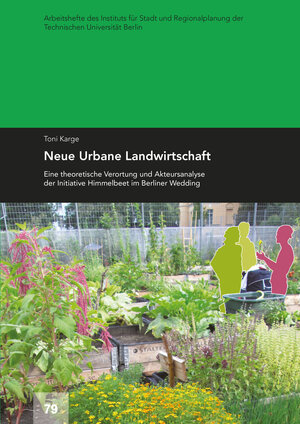
×
![Buchcover ISBN 9783798327542]()
Neue Urbane Landwirtschaft
Eine theoretische Verortung und Akteursanalyse der Initiative Himmelbeet im Berliner Wedding
von Toni KargeThe research project ‘New Urban Agriculture’ (original title ‘Neue Urbane Landwirtschaft’) deals with urban gardens including their significance for cities. Further, it analyses the communal project ‘Himmelbeet’ (trans. ‘haven patch’) located in Berlin on the basis of its constellation of actors.
With regards to an urban theoretical debate, Europe’s special planning history (from the Roman Empire to today), as well as the idea of urban utopian historicity (from Morus’ Utopia to Callenbach’s Ecotopia) are analysed in terms of their assertions about urban gardens. It elicits the question as to which degree urban gardens have been and are part of European Cities. Moreover, urban agriculture is located within the urban sociological discourse on city and country.
After an illustration of hitherto established development by new movements of urban gardens (including initiatives in USA, Cuba, Germany and Austria), and after its location within political discourse and anti-globalisation movement, ecological sustainability and social solidarity; an analysis of gardens with regards to gender-specific aspects is conducted which critically examines the thesis for gardens as still being feminine connoted gender-territories.
The actor’s analysis in the second part of the research project rests on an ethnographic case examination of the communal garden project ‘Himmelbeet’ in Berlin and deploys the method of Participatory Action Research. In contrast to recent studies, focus of the thesis at hand is the formation period before the garden’s actual opening. Both key actors (stimuli, door openers, veto-agents), and actor groups are herein characterised by means of levels of their contribution with regards to ideas, network, finances, work and power. The outcomes are further categorised by 5 phases: initiation, consolidation, planning, alternation, realisation, and juxtaposed with an agent mapping. Besides users as primary actors, procedurally involved secondary and tertiary actors (e. g. institutional frame) are investigated. A gender and exclusion investigation generates insights about integrative effects of the garden project during its initiation period.
The outcomes of the actor-based analysis are conveyed to theoretical relations of the first part and critically evaluated in terms of dissents and confirmations of the latter. The research project is accompanied by brief excursions to urban gardens in Aarhus, Barcelona, Frankfurt, Cologne, Milan and Munich.
With regards to an urban theoretical debate, Europe’s special planning history (from the Roman Empire to today), as well as the idea of urban utopian historicity (from Morus’ Utopia to Callenbach’s Ecotopia) are analysed in terms of their assertions about urban gardens. It elicits the question as to which degree urban gardens have been and are part of European Cities. Moreover, urban agriculture is located within the urban sociological discourse on city and country.
After an illustration of hitherto established development by new movements of urban gardens (including initiatives in USA, Cuba, Germany and Austria), and after its location within political discourse and anti-globalisation movement, ecological sustainability and social solidarity; an analysis of gardens with regards to gender-specific aspects is conducted which critically examines the thesis for gardens as still being feminine connoted gender-territories.
The actor’s analysis in the second part of the research project rests on an ethnographic case examination of the communal garden project ‘Himmelbeet’ in Berlin and deploys the method of Participatory Action Research. In contrast to recent studies, focus of the thesis at hand is the formation period before the garden’s actual opening. Both key actors (stimuli, door openers, veto-agents), and actor groups are herein characterised by means of levels of their contribution with regards to ideas, network, finances, work and power. The outcomes are further categorised by 5 phases: initiation, consolidation, planning, alternation, realisation, and juxtaposed with an agent mapping. Besides users as primary actors, procedurally involved secondary and tertiary actors (e. g. institutional frame) are investigated. A gender and exclusion investigation generates insights about integrative effects of the garden project during its initiation period.
The outcomes of the actor-based analysis are conveyed to theoretical relations of the first part and critically evaluated in terms of dissents and confirmations of the latter. The research project is accompanied by brief excursions to urban gardens in Aarhus, Barcelona, Frankfurt, Cologne, Milan and Munich.


